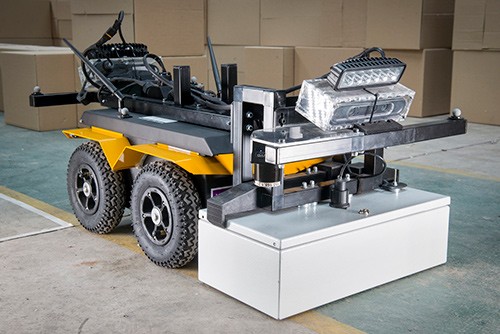Professor Barry Lennox awarded engineering Chair
Next-generation cameras that can see round corners, human-centred robots that can adapt to an individual's assistive needs and light-powered retinal implants that can restore people's vision are among the disruptive innovations championed by the Royal Academy of Engineering's latest Chairs in Emerging Technologies.
The Academy has made awards totalling over £20 million in research funding through its Chairs in Emerging Technologies programme, providing long-term support to nine world-leading engineers across the UK to advance emerging technologies.
 From The University of Manchester, Professor Barry Lennox FREng has been named as one of the nine recipients of the prestigious award. Professor Lennox, of the School of Electrical and Electronic Engineering, will lead on the development of robotic systems for use in nuclear facilities, helping to reduce the risks associated with humans entering hazardous environments. The project will deliver cutting edge technology so robots can reliably carry out complex operational tasks in 'dirty' and unstructured environments, enabling robots to become commonplace in all areas of the nuclear industry.
From The University of Manchester, Professor Barry Lennox FREng has been named as one of the nine recipients of the prestigious award. Professor Lennox, of the School of Electrical and Electronic Engineering, will lead on the development of robotic systems for use in nuclear facilities, helping to reduce the risks associated with humans entering hazardous environments. The project will deliver cutting edge technology so robots can reliably carry out complex operational tasks in 'dirty' and unstructured environments, enabling robots to become commonplace in all areas of the nuclear industry.
Professor Lennox said: "The potential benefits that robotic systems offer the nuclear industry are vast, from accelerating the decommissioning of the nation's legacy facilities to enabling the effective operation of future nuclear fusion power plants.
"Unfortunately, developing robots that are able to operate in the nuclear industry and perform the complex tasks that are necessary is challenging and will take time. The Royal Academy of Engineering Chair in Emerging Technologies allows me to establish a sustainable programme of research over the next ten years that will be able to deliver robotic systems that can make a real difference to the nuclear industry."
The new technology areas developed by the Chairs in Emerging Technologies have the potential to considerably benefit society and the UK economy, and enable the nation to remain at the global forefront of engineering innovation. The areas of research funded reflect the UK's wider technological priorities, with many of the projects directly aligned to the government's Industrial Strategy and designed to tackle some of the biggest industrial and societal challenges of our time.
The ten-year support provided to the Chairs will enable them to progress their pioneering ideas from basic science through to full deployment and commercialisation.
The new technological areas advanced by our Chairs in Emerging Technologies have the potential to transform our everyday lives, as well as positively impact the UK's economy and generate new sources of wealth. Engineering is critical to achieving the goals of the UK government's Industrial Strategy, and investment in emerging technologies means that we can secure our footing in important future markets. For these technologies to reach their full potential it is important to invest in the pioneering individuals who advocate for them, as without their vision and foresight it is difficult to identify the products and services of tomorrow.
The nine Chairs in Emerging Technologies are supported through the UK government's Investment in Research Talent initiative. In recognition of the importance of engineering research to the UK, the government has provided the Royal Academy of Engineering with a significant increase in funding to attract and retain the best research talent to the UK and support their work.


